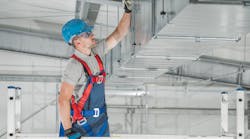With spring on the horizon, it’s almost time to shut down the heating units and crank up the air conditioners. While the next heating season is still over six months away, it’s important to ensure you are taking the proper steps to maintain your unit during the offseason. After remaining operational throughout the winter months, building owners are advised to inspect their heating units to make sure there are no damages that may cause problems when Old Man Winter rears his head.
Where to Start
At the end of the heating season, a general inspection will be beneficial to help extend the life of the unit and avoid preventable repairs. One of the first components you will want to inspect is the heat exchanger. The heat exchanger is a component within an HVAC system that transfers thermal energy. During the inspection, you will want to make sure the component is still intact with no rusting or cracks. If the heat exchanger is cracked, it can allow carbon monoxide to leak from the unit. For safety reasons, facility owners should quickly repair or replace the unit if the heat exchanger is damaged.
In addition to focusing on the heat exchanger, facility owners will want to inspect the vent pipes on the unit. As the products of combustion leave the unit, they go through the vent pipe and out of the building. That means it’s critical for the vent pipe to be clear of any blockages. It’s also important to check for any rusting that may have occurred during the heating season.
Both the control panels and the burners are important components to inspect as well. The inspector needs to make sure the controls are working properly and all the wiring is intact. You will want to clean any dirt and debris off the burners to maintain their integrity and keep them operational.
The motors of a heating unit sustain plenty of wear and tear during the heating season, making it one of the most repaired components. Facility owners will want to look and see if the motors are in good working condition. Some motors are not sealed and will need to be oiled. If that is the case, you will want to oil the motors once a year. Cleaning the dirt and dust off the motors at the end of the heating season is vital as well.
These general tips will go a long way in ensuring there are no surprises when you turn your unit on during the next heating season.
Heating Efficiency
While performing general maintenance can help extend the life of a unit, some units may be beyond saving or being used far past their operational life. In this case, it’s time to replace those units. If saving money is a priority for your facility, consider installing a high-efficiency unit heater. High-efficiency unit heaters can provide up to 97% efficiency, depending on the unit you select. The more efficient the unit, the more fuel savings the facility owner will receive. While the upfront and installation costs are higher than a traditional unit, the return on investment can be seen in as little as two to three years.
It's also beneficial to have a programmable setback thermostat for facilities where the heating units aren’t controlled by its building management system. These thermostats allow you to determine when and at what temperature the unit is operating at. This allows facility owners to set the temperature lower when the facility isn’t in use, maximizing efficiency and limiting fuel use.
End of Season Maintenance
The end of the heating season is the perfect time to prep your unit for future use. More emphasis can’t be placed on the importance of simply keeping the unit and its components clean. Many repairs and failures can be avoided by inspecting and cleaning the unit after prolonged use. Doing a thorough visual inspection will go a long way in preventing surprise breakdowns and repairs. Whether you are using a traditional heater or a high-efficiency unit, develop a plan that includes regular maintenance to avoid operating headaches at the beginning of the next heating season.


